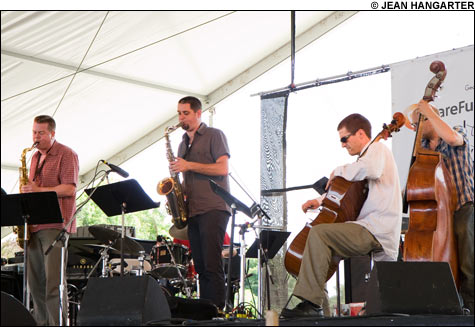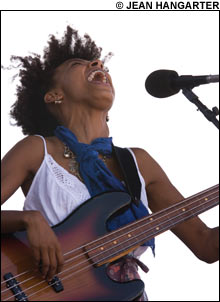
SHOCKER: The Vandermark 5 had no trouble commanding the HarborStage with their anthemic skronk. |
The biggest news made by the Newport Jazz and Folk Festivals the past two weekends was that they happened at all. For those of you who've been living outside the rock from under which jazz fans see the world: in 2007, venerable Newport-fest impresario George Wein, now 83, decided to sell his company, Festival Productions, to upstart Festival Network. The 2008 shows came off, but then rumors began to surface that Festival Network was in trouble. The state terminated its license to Fort Adams State Park for 2009. Then Wein's sponsor of 24 years, JVC, pulled its support. The JVC–New York Jazz Festival, which had been created by Wein, was scuttled entirely. In January — very late to be booking a summer festival — Wein decided that the show must go on. He'd sold the names of the festivals, so he came back with George Wein's Folk Festival 50 and George Wein's Jazz Festival 55.

Or, as he explained about the business problems from the Fort Adams Stage at the Jazz Festival this past Saturday: "They ran out of money or something." Ensuring the security of the festivals into next year was CareFusion, a health-care company that came on board at the last minute as a title sponsor.
Okay, business done and done. Perhaps even better news was that both festivals were artistic successes. The Folk Festival booked everyone from Joan Baez and Pete Seeger to the Decemberists and Bon Iver. The Jazz Fest covered the mainstream with Dave Brubeck and Tony Bennett, the avant-garde with Charles Gayle and the Vandermark 5, and their pop cred with Mos Def. Not bad.
"This is the first US festival that has invited us to play our own music," Vandermark told the crowd at the Harbor Stage on Saturday, after saying that it was an "absolute shock" for the band to be at Newport. He thanked Wein, who listened intently to their set from the side of the stage.
Newport offers a chance to test not only jazz's overall economy (as in, who's going to pay for it) but also æsthetic economies of scale. Can intimate, often abstract, instrumental music project to the cheap seats — or in this case, the beach chairs under open sky way out by the water on the expanse in front of the big Fort Adams Stage? Does it still mean anything if it does? For more "jazz-sized" venues, the festival has the open tents of the Harbor Stage (about 450 seats plus standing-room overflow) and the Waterside Stage (150 seats plus overflow). And the range of fans tends to be broad as well — twentysomethings content to sunbath and nap all day for the privilege of catching Saturday closing act Mos Def, middle-aged African-American men who wear "Trane" T-shirts and bring their wives and daughters to the show.

THE IT FACTOR Esperanza Spalding’s triumph on the main stage was a foregone conclusion. |
On just about any scale, singers get the edge, and that made Esperanza Spalding's triumph on the mainstage Saturday a foregone conclusion. You can argue over the pop qualities of her homonymous major-label debut, but jazz's current It girl knows how to play (bass, in case you hadn't heard). And yes, she's chic and stage-savvy. ("That's the first note," she told a blasting boat horn in the harbor before one song, and then, when the blasts kept coming, "You're sharp. But that's cool.") So when the cameras projected her face on the jumbotron, head tilted back, eyes closed and mouth open as she let loose a long, held high note underlined by keyboardist Leo Genovese's synth, well, it was game, set, match, Ms. Spalding.The jumbotron's abetting of visual music didn't hurt pianist Michel Camilo, either. His bravura chops are always a crowd pleaser, especially when you can see them on the big screen — blurring double octaves, keyboard-length glissandi. But Camilo always earns his big moments with sharp bebop detail, solid arrangements, and great grooves, whether he's fashioning a descarga for Tito Puente (with a beautifully deployed recurring quote of "Oye Como Va") or bringing out Joe Lovano for a rousing "Night in Tunisia."
Bruising virtuosity and great grooves earn a lot of capital on the big stage, and they can carry you into the music's most abstract outer reaches. Vandermark has been rearing his little band of Chicago renegades in church basements, alternative performance spaces, and rock clubs for the past 12 years, and on the Harbor Stage he proved that with a great groove you can go just about anywhere. His band alternated rock-beat ostinato rhythms with hard walking-bass swing, one section releasing into the next, often demarcated by anthemic fanfares from him and fellow saxophonist Dave Rempis. Following the especially rocking number "Cement" by drummer Tim Daisy — with a skronking, guitar-hero turn from cellist Fred Lonberg-Holm — a pre-teen female voice from the audience shouted, "Hey, that was awesome!" Put 'em on the big stage, I say.